By Claire Bacon, ACN, CNC
Martha Clemens Bobo was born January 18, 1936. Practically all her childhood was spent on her family’s farm in Phoenix, AZ. When she was 6 months old, her mother took her to Europe, where they would spend the next year and a half. Interestingly, her mother had an unusual gift – being able to sense premonitions of what was to come. As a result, she wanted to spend some time with her German family before anything may happen to prevent travel to the area or back home. We are overjoyed to share Martha Bobo’s story here…
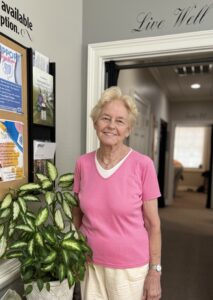
(As a side note, the C in Clemens may indicate the family’s distant Polish heritage. The family’s ancestors lived close to the German-Polish border. Whereas the German spelling would have been Klemens, it was typical of Polish ancestry to use the C).
Martha: And so she had taken me over at 6 months, and I came back with her when I was 2 years old. She brought her Mother back with her, too. That was around 1938. And the rest of my childhood was spent on the Arizona farm, doing farm chores, going to school… of course in those days we walked to school, about a mile at least. We lived off a dirt road, way out in the boondocks.
Martha On Life in Phoenix
Many years ago, the Phoenix area was full of beautiful and expansive citrus, vegetable, and flower farms. The flower farms in the South Mountain area were largely owned by Japanese-Americans, until they were incarcerated during the war and forced to abandon their homes and farms. And then their kids didn’t want to follow in their parents’ footsteps. So, that did away with a lot of the farms out there. When I left, they were developing that into subdivisions and so on.
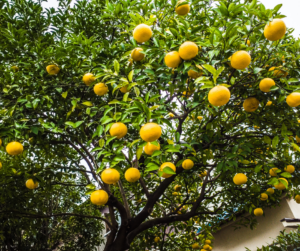
Young Martha on the Farm
We lived on the North side of Phoenix. My parents were into everything: my mother made butter to sell; we had eggs. Sometime in the early 40’s my parents bought the property adjacent to them, which had citrus trees and apricots. Eventually we were able to grow tomatoes under the citrus. One of the things my Dad was well known for was on the homeplace, we grew blackberries. He was really the only one around who had a blackberry farm. And so that was my job as a child – to pick the blackberries in the summer. Because we couldn’t employ people to pick them, because they either squished them, or ate them!
So at a very early age, that’s what I had to do. I didn’t like it, but it was necessary, and it was a nice cash crop for my parents. You know, they had to work so hard for the things they had.
Is that where you developed your love of gardening?
Martha: Yes, really, I always enjoyed gardening. My Dad was a gardener, although he didn’t have a lot of time to do it. He encircled a certain area in the front yard where I could have my flowers, and experiment there. But sometimes the cows and the donkey would get loose and they would eat things. He had to put a fence around it.
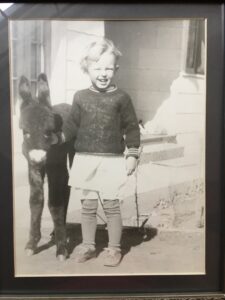
We were best buds. Rosy would get out every once in a while, and she would come to the kitchen window. I don’t know why, but she knew people were in there, and I guess she thought she could get a treat.
We were really the only farm in that area; the others were homestead places. Actually, it became a ritzy area later, and our house was demolished to make way for a new neighborhood.
I remember my Dad would deliver the citrus and the apricots to the store, and also we had pecans. Until it got to the point that the stores wouldn’t take them anymore, because they preferred to deal with the large corporations. So, they wouldn’t buy from the small farmers anymore, and that hurt them. Eventually it wasn’t profitable anymore. My parents sold the farm (in the sixties) and moved to a subdivision.
Martha’s European Ties

After high school, I left Phoenix and went to live with my Aunt in Europe – in Wetzlar, Germany on the Lahn river. It was more affordable to go to school there than to go to college in the U.S. I used my babysitting money for the passage. Actually, German was the first language I spoke – up until kindergarten, and then of course you know how kids are – to be like everyone else I turned over to English and then didn’t want to speak German. My Grandmother passed away when I was twelve, and it was at that point when we didn’t speak German in the house anymore.
Difficulties of Being German
And, of course, it was frowned upon (during the WWII years) to speak German. (whispering) We had the FBI agents come out, because somebody told them that my Mother was signaling to German planes or something – it was ridiculous – there wasn’t anybody in the desert out there. As if my parents didn’t already have enough to do, to do something stupid like that. No, my parents were citizens already. There was a neighbor who didn’t like Germans, was what it was, so she called the FBI. I can still see them right there, sitting in the living room. But my parents all checked out, and we didn’t have any trouble from the authorities.
Before my Dad started farming, he couldn’t get a job, because he was German. So he decided to tell people he was French. Until the day he died, he was “Frenchie”. (laughing) That’s a funny story, not so funny for him at the time. I asked him once if anybody challenged him in speaking French? He said, “if they did, I told them I’ve been gone so long I’ve forgotten it.”
Martha’s Life in Spain
While living in Europe in my early twenties (around 1956) I learned Spanish and moved to Madrid, and worked as an interpreter.
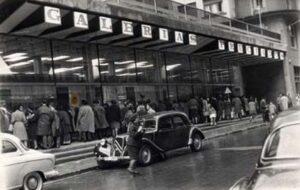
I was working at the Galerias Preciados in Spain, which was THE department store, many stories tall. These tourist groups would come in, the Americans or English and the Germans. I would take them around, and they would ask me various questions about the items there. The most harrowing – it was quite a challenge – was when I had two groups (one German, one American) at the same time and I had to speak one language here, speak another language there. It was interesting!
I also got to meet Francisco Franco’s daughter, Carmen, because I worked in the jewelry department there, and she happened to be part owner of the Galerias. She’d come and purchase jewelry, she was very nice. It was the only department store around. I worked there about six months, and was in Spain maybe a total of 8 months. After that I went back to Germany for a while, and then back to the States.
At what point did you get married?
Martha: In August of ‘57, my husband came over with my Dad. He had been a family friend a long time before. My Dad and his Dad had been friends a long time – and I had been friends with Robert. I had dated him before I left for Europe, in that summer. Dad wasn’t trying to fix us up, it was just happenstance. Robert was very intelligent; he had a high IQ.
When I was a student and came back from Germany, it was funny – I couldn’t speak English. It wasn’t hard to pick it back up again, but at first I couldn’t understand English. (laughing) It was really weird, because I was so engrossed in the foreign language. You know, the Germans couldn’t generally realize I was a foreigner, because my accent was so good. If they did think I was foreign, they thought I came from Sweden, because I had blond hair and blue eyes.
Martha on Early Married Life
For a while, I helped my husband in his dental practice – I took care of the books, and enjoyed that. I did that until Ingrid came, and then… well, I had a lot to do. We met a lot of people through the practice. My husband retired around age 50. And then we did some travels – we went to South America, Central America, and Mexico.
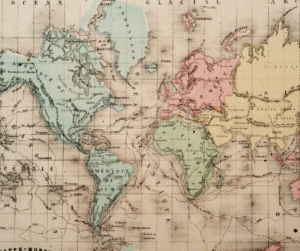
Out of all your travels, where is your favorite place to be in all the world?
MB: Well, a lot of people would choose Paris, but that is not my favorite. Hmm… so hard to say… As of about 2010, I have traveled with my gardening group to different parts of the world. For instance we went to New Zealand, to Belgium and Holland for the tulip festivals. The last trip was to Slovenia and Croatia, which was great as we were on a yacht. And we were a small group, which made it so much nicer. We would stop here, there, and yonder. And I got to walk into Dubrovnik – that famous wall around the Old Town, I walked that.
We’ve been to Italy and Sicily – they had more Greek temples there than even in Greece because the Greeks orginally (back in ancient times) had settled there. So they have this Valley of the Temples, which was fascinating to me. I’ve also been to Ireland, and would love to go to Scotland sometime.
I’d have to say my days in Germany and Spain were superb. I regarded those as my second home. It was magical in many ways.
Martha Looking Back…
Back in Germany and Spain… You know, you didn’t have everything at your fingertips. You had to strive to do things. We didn’t have the cell phones we have today.
CB: Like for eggs, you’d have to go to the farm. And for milk, you’d go to a different farm?
Martha: Yes, even in Germany I remember taking a little can that my Aunt had and went down to a particular little store and they filled it with milk and that’s what you took home. Now you’ve got everything in cartons that fills the landfills and all that. We didn’t have to worry about disposable stuff.
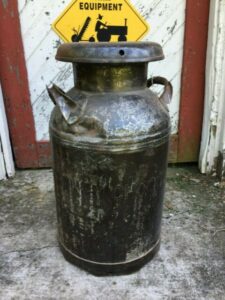
The Way things Were…
And I think back to when we first had plastic… We had tin cans that the food was in; we had glass, that was it. There was no plastic. We had cellulose – for instance some of the hairbrush handles were made out of that. They are now collectible items.
Even the garbage we had on the farm – my Dad just burned it. There wasn’t that much of it. We recycled a lot. For instance, our chickens’ eggshells. We had to crush those up and fed them back to the chickens. It made their eggs stronger. They ate their own shells, and it formed a better shell on their eggs.
Composting in the Garden
My Dad never used artificial fertilizer. We had cow dung to do that. That’s what he spread around the blackberry plants and everything else that we had there. He never used any sprays of any sort. You don’t need to if you’re rotating the crops and using the compost.
Actually, that’s what I do at my place here. Impatiens, for instance. They die when the freeze comes out. So I just chop them up, turn them up into the ground, and let it fallow for the winter. And it deteriorates. And even the flowers from the hydrangeas and so on, I spread that all around and cover it with mulch. It becomes good nutrients for the next plant. And even kitchen garbage – that’s what I do – I throw it outside for the plants. (laughing)
When did you move to Atlanta?
I’ve been here in East Cobb ever since April 15, 1996 – tax day. The only reason we came here is because my daughter asked us. My son had left Phoenix – he had gone to California with Chubb Insurance Co. and later on to Houston. And at that time my daughter, Ingrid, needed babysitters (laughing). She had young children – Grant in ’92, then 16 months later came Lysette, and then around 6 years later came Chloe.
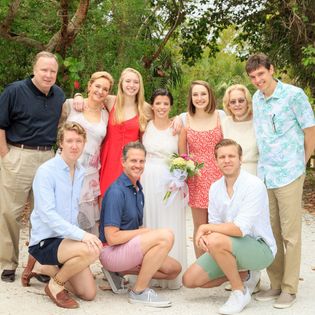
Tell me about your garden?
Martha: It used to be, at my old home, I would only garden in the shade. I avoided the sun. And I was never a sunbather, either. As I used to pick blackberries in the sun, that was enough to cure me of that business. But I still try to do things where it’s shady. The neighbor’s trees give my yard a good bit of shade.
Regarding flowers: I’m a big fan of hydrangeas – some varieties do better in the shade than the sun. And flowers – well, I like impatiens – they only need a half day’s sun. And lilies do well only partly in sun. Gardenias are good – some can take full sun, some take half sun, just depends. But my love are the hydrangeas, I’m afraid. I had a hundred of them at the last house. I have about nineteen where I am now. Particularly the paniculatas (the cone shapes) not the mop heads. Most of them are white, so it is very pretty.

Wildlife Around the Garden
At the old place, I had some problems with the deer. In fact, there was one time there were two 8-pointers in the yard, and it was a little dry around the river, and you know hostas are like dessert for them. Right now, my biggest problem is a bunny rabbit. (laughing) And not long ago I found – believe it or not – a dead vole in the yard that I suspect my dog got a hold of it. But otherwise, I haven’t had much problem with animals chewing on things – except for the bunny rabbit. 🙂
I have a little plot close to the birdfeeder with herbs. There, I have a few pots, and I grow strawberries in that. I have a rosemary there, and in the pot I have a lavender that keeps the mosquitoes away. When I sit at the patio, I don’t have the mosquitoes. When I go further out where the other plants are, they attack me. (laughing)
With your cooking, do you draw from different influences from your travels?
Martha: Well, the problem now is I’ve lost my sense of taste. So, I tell everyone I’ve taken up English cooking because if I can’t boil it I can’t cook it. (laughing) Yes, but I liked to experiment with all different kinds of cooking. Of course, my background was some German, and having lived in the Southwest, and in Spain I picked up a few things there. But I was a great experimenter because my generation was heavy into casseroles – and I didn’t like casseroles. I didn’t like the different mixtures, I guess. So, I experimented with a lot of different recipes. And I always found my best recipes, believe it or not, in the newspapers at the time.
I have only one recipe that I follow ‘to the t’: Hubert Humphrey’s beef stew. I always made that according to the measurements there. Everything else, I always managed to fiddle with and change something. (laughing) Depending what it is, some recipes you have to follow and use the exact measurements. Some things are a handful of this and a pinch of that.

What traditional meals have been your go-to’s?
Martha: As far as when I had holiday meals, I liked doing duck or goose, much better than turkey. That was mainly what I served at the Christmas dinners. And I liked potato dumplings. I had a special bean recipe because I had a special bean cutting machine – that would do French cut. That’s what the grandkids would request when they come here.
I used to grind my own wheat for bread. Because I had read up that the whole wheat roughage was very good for you. And good for my husband, as he had diabetes. And I had him off the insulin for two years because of that. I got the special wheat from the Mormons in Idaho. It has no chemicals in it, and was heirloom – it hadn’t been hybridized. At this point, I just don’t eat bread much anymore.
Martha’s Thoughts on TV Dinners
Talking about TV dinners, they had gotten to be quite popular, and we were driving somewhere one night with the neighbors. I think Ingrid was about 14 or 15 years old, and they mentioned something about it and Ingrid asked, “what’s a TV dinner?” And I thought, oh goodness, I’ve been remiss. So I bought her a TV dinner so she could see. Because I always cooked everything from scratch. The only time I used canned food was canned tomatoes when I’d make Spanish rice. Everything was fresh and from scratch. So, I wasn’t one to grab onto the latest thing that came out. And because of that, too, I rarely ever eat fast food. It’s just not in my diet, that’s all.
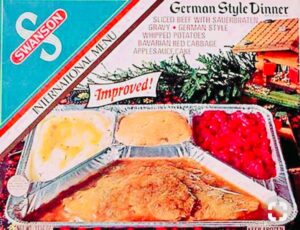
I just figured there were too many ingredients in there that I didn’t know, I didn’t trust it. And salt is another big factor. And sugar was put into just about everything. So, I decided that was not what we wanted – and I didn’t want to raise the children that way, to get used to that kind of stuff. If they ate it out when they were with friends, that’s fine, because that’s part of the socializing. But in the house, no. I didn’t use any of that. And I don’t think I ever ordered a pizza, come to think of it. I mean, I knew what it was and had eaten it when out sometimes with friends, but no. I did my own bread; I did my own pie crusts. I didn’t buy the pre-made doughs or anything like that.
Did you ever go through a period of unhealthy eating?
Martha: I think I just pretty much stayed the same way. Fresh produce was always my aim.
What other activities did you do to stay healthy?
Aside from gardening, I remember bicycling but that was many years ago. As a child, I would bicycle for miles, and I had a basket in front of my handlebars, and my kitty cat would sit there – she loved to go, and she would groom herself while I was riding. I would ride over to the Arizona Biltmore hotel, which was a fancy place. And I remember coming across that comedian – Jerry Lewis – as he golfed there, and Ronald Reagan, too. I was athletic in high school and played basketball and softball. But it has been gardening mostly in my adult years.
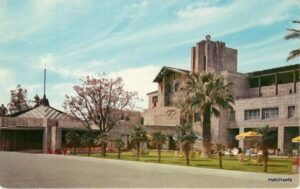
And when I was in Europe, I just walked. I had no conveyance. When I had to go a long distance, I’d go by bus. I didn’t need anything else. You do miss a certain amount of that now, not being in a walkable community. But at my age now, it’s OK.
I hear you’re moving to Chattanooga?
Yes, and I understand they have terrific garden clubs there, so I won’t be lacking anything. And I’ve already acquainted myself with the neighbors. And I’m looking forward to going to the Aquarium downtown; I haven’t been there yet. So we’ll see!
The new house is across the street from my grandson, Grant, so he’ll keep a good eye on me. The house has the main bedroom on the first level, which is good – I don’t have to climb the stairs that much. Although I don’t mind climbing stairs, I’m always going up and down. But anyway, I have really strong calves because of that. I don’t want to stop doing the activity because it keeps me strong.
And gardening helps a lot there, too, because you’re always bending, lunging, kneeling, or doing something like that. I have a set of roofer’s pads for only when I have to kneel. But I can bend real well without having any pads.
Working at the Atlanta History Center
I was working at the Atlanta History Center Garden – before Covid, I worked there for several years as a volunteer. And there were very young ladies working there in their garden group, and they couldn’t believe how I was bending down. They said, “how do you do that? We can’t even do that!” And they couldn’t. So they were trying to emulate me. (laughing)
The Botanical Garden is really beautiful, as well. I used to be a docent there, a long time ago, before I joined the History Center. At some point, when my husband started getting ill, it just got to be too far. That was such a far trip to take. So the History Center was much better. If I got a message he needed any help, I could be home very fast.

What do you do to maintain your positive mental attitude?
I’ve always had the philosophy that to be negative influences other people, and it doesn’t do the world any good. So even if I don’t feel well, I will act happy. Because it’s the happy people who make the world better, I think.
– Martha Bobo
And I read. I will not read other than the classics. Romance novels – I haven’t got time for that. But I like to read true stories, factual books. And I play some games like Sodoku, certain types of solitaires.
Martha and Her Favorite Books
When I was in college at ASU, history was my major. And later on to AIFT American Institute for Foreign Trade, where they trained you to go into foreign service. So I have a lot of history books and like true stories about interesting people, like Ava Gardner. I like spy novels. I read the Man Without A Face by – he was a German man. He wrote about espionage within the Stasi government and the things that really went on – this was a true story. And about Albert Schweitzer – I read that in German.
So many of life’s lessons can be learned by reading the classics – like the Iliad, stuff like that. The really old classics, especially the Greeks and the Romans, because it still applies today. But I think the younger generation isn’t at all interested in that, because it’s… um… old. Right now I’m reading A Nation of Sheep. It’s 60 years old and a paperback. I read the story of the Krupp family – they were very influential during WWII.
I recently donated a bunch of books to the Half Price Bookstore, as I can’t move with them. But I don’t want them to be destroyed. I want them put out for people to enjoy. These are English books I took there. I’m trying to get rid of all my German books, too. I can’t find anybody to take them.

Maybe someone will read this and can take them off your hands!
Martha On Writing Cursive…
The other day I was going through some stuff to throw out and I came across something I wrote when I was 10 years old – in cursive. When we learned to print in first grade, after that no more printing was allowed. It was only cursive. And it was faster! So why did they do away with it? I went to my old high school and they don’t even teach it anymore. It’s a shame. I contend 100 years from now they’re going to have special courses in college on how to read cursive.
There was a time when Ingrid was in school and her writing got pretty sloppy. She wanted me to read her story or whatever it was she was writing, and I couldn’t read it. I said, “this is it!” So I made her do what I learned when I learned to write. And I remember how they did it – you had to make these circles, up and down. (motioning) You know, if you’re going to write cursive, you’ve got to make it legible for crying out loud! And printing is laborious for me. It takes longer.
And writing in cursive is so valuable. I have some stuff that my Grandmother did – her handwriting was beautiful. My goodness, and my Mother always complained about her own handwriting being sloppy. No, it wasn’t. It was much better than you see today, at all. And the handwriting of a person gives an insight of their personality, as well. It shows you that they’re caring, I think. Of course, what do I know? (laughing)
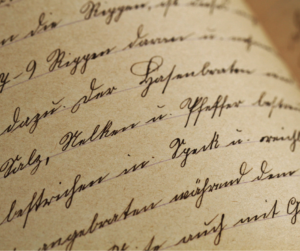
Childhood illnesses – were any of those things difficult?
No, I guess I was a tough cookie, although I will say this. Apparently, this was a story my Mother told me… When I was in Europe, I did get three different things all at one time, including whooping cough. Measles, whooping cough, and something else. But I got through that. I remember one time as a child, I got the flu. And at that time, the way you cured the flu was a shot of whisky. And that’s what I got. Well, what germ wants to hang around with that? (laughing) I was very lucky, in that, I just didn’t get sick. No allergies, nothing. Even now, I don’t get any of that sort of stuff.
CB: They say that kids who get their hands in the dirt have good immune systems.
Martha: My husband – he went through Univ. of Oregon dental school. And they would have instructors from the medical school. There was one doctor who came over from the medical school and he said “the best thing that anybody can do for a baby is roll it in a pile of manure. And that keeps them from getting a lot of stuff.” (laughing) And we played in the dirt. We weren’t told by our parents “you can’t touch that.” We were with animals, you get into things, you’re out in the fresh air. It’s just now, I think we have too many helicopter parents who don’t allow them to do this and that in the outside, and they’re not exposed to develop the immunity to it. And we’re too sanitized. You know especially when you’re on a farm you can’t avoid some of those things – you get your hands in chicken poop and so on. You know, collecting the eggs sometimes it’s that way. Or you step in a cow patty. (laughing) Yes, I think the children today are too protected and their health seems to be suffering.
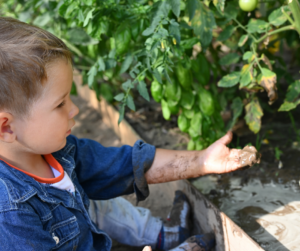
Any tips for getting good sleep?
When my son and daughter-in-law got married, I advised them, “never go to bed angry with each other.” That’s one of the things I’ve always lived by. That, and try to only think of pleasant things. And also, maybe a little bit of milk and honey before bed. Which seems rather mundane, but it works!
Any advice you would give the younger generation?
Oh my. The thing I would say is to keep an open mind. And don’t believe everything you hear; research it well. That would be about the only thing I could really say. That gets you through a lot, because you know, the book I’m reading now – it’s about the embassies in foreign countries, how we were duped as Americans. You know, even when I was in Germany, I remember some things that were broadcasted in the U.S. that I know darn well weren’t true, because I was there. That wasn’t the truth in Germany. You know, people couldn’t tell back then that what they were seeing was propaganda. They didn’t have the Internet, like now. They didn’t have access to information, good or bad.
CB: And the critical thinking and reasoning today, maybe is a challenge?
Martha: I don’t think people use a lot of common sense these days. People just accept what’s being fed to them.
CB: And like you were saying, how much value you get from playing near the creek or exploring in the neighborhood…
Martha: And you learn that way, too. You learn to observe whether it’s safe or not. And not let yourself get into things you might regret. (laughing) And I feel like there needs to be more of that.
Martha on Making Mistakes
And I have to mention the helicopter parents – they don’t want the little ones to get hurt. Sometimes you have to let them experience it. I remember our son being on his bicycle one time, fooling around. We had what we’d call cyclone fences and they had the spokes up like that, see, and we warned him, “watch out for what you’re doing.” He got into it, and got cut; well, he never did that again. But you have to let them experience things. That’s how they learn. Because then when they get to be adults, it horrifies them if something goes wrong. You know what I’m trying to say? They can’t handle it. They have to go see a psychiatrist or something.
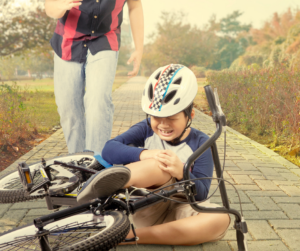
CB: You said earlier, you’re a tough cookie. You have to go through some hardship and introspection to become a tough cookie.
Martha: Yes, you really have to. You have to learn that way. I mean, I was extremely shy as a kid. But I observed a lot. I think that helped me a lot. I didn’t go half-cocked off on things. Then afterwards, as an adult, you learn to take things calmly. I mean, things just don’t excite me. People get awfully excited about something. No, think about it first. Is it really that big of a deal? I just, you know, say “well, it’s just the way it is.” You just have to watch. There are bigger things to worry about. God knows there are in this day and age. (laughing)
Absolutely, Martha! We 100% agree with you! Thank you for sharing your wonderful memories and wisdom!
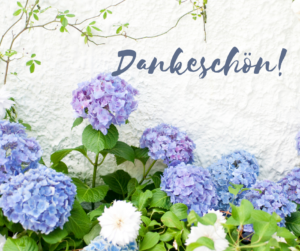
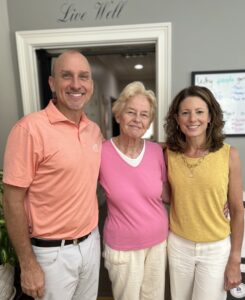
Other Blogs On Longevity and Aging:
https://www.drbobbacon.com/a-nutritional-approach-to-parkinsons
https://www.drbobbacon.com/changes-in-menopausal-hormones
https://www.drbobbacon.com/nutrition-for-healthy-bones
https://www.drbobbacon.com/lessons-from-the-greatest-generation-dr-len-mather


